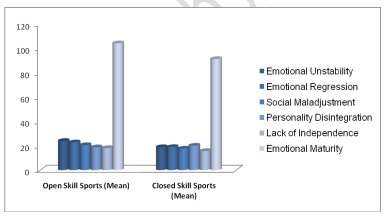A CROSS SECTIONAL STUDY OF EMOTIONAL MATURITY AMONG OPEN AND CLOSED SKILL SPORTS
Keywords:
Emotional Maturity, Open Skill Sports and Closed Skill SportsAbstract
The purpose of this investigation was to find out the significant difference of Emotional Maturity among Open and Closed Skill Sports. The researcher collected the data on Seventy Two (N=72), Male subjects between the age group of 18-28 years were selected. The subjects were purposively assigned into Two groups: Group-A: Open Skill Sports (n1=36) and Group-B: Closed Skill Sports (n2=36). The survey method through the technique of questionnaire had been adopted to collect the relevant data for this study.For evaluating the levels of emotional maturity among subjects, Singh and Bhargava’s (1988) Emotional Maturity Scale was used. This scale consists of five parameters namely, Emotional unstability, Emotional regression, Social maladjustment, Personality disint egration and Lack of independence.The differences in the mean of each group for selected variable were tested for the significance of difference by t-test. In all the analyses, the 5% critical level (p<0.05) was considered to indicate statistical significance. The significant between-group differences were found for emotional unstability (t=4.350),emotional regression (t=3.422),social maladjustment (t=2.807),lack of independence (t=3.409) &emotional maturity (t=5.291). The data further reveals that insignificant between-group differences were found for personality disintegration (t=1.128)
Metrics
References
Hardy, L., Jones, G., Gould, D. Understanding Psychological Preparation for Sport: Theory and Practice of Elite Performers.Chichester, John Wiley & Sons (1996).
Martin, A.D. Emotional Quality Management, Jakarta, Arga (2003).
Orlick, T. In Pursuit of Excellence (2nd Ed.). Champaign, IL: Human Kinerics (1990).
Rathee, N.K., Salh, M.S. Exploring Cognitive Style and Emotional Maturity among Indian Handball Players Performing at Varying Level. Int. J. Sports Sci. Phys. Ed uc., 1(1): 26-33 (2010)

Downloads
Published
How to Cite
Issue
Section
License
© 2025 International Journal of Behavioral Social and Movement Sciences. All Rights Reserved.
All content published in this journal, including articles, images, and other intellectual property, is protected by copyright law. No part of this publication may be reproduced, distributed, or transmitted in any form or by any means without the prior written permission of the publisher.
For permissions and inquiries, please contact us at: editor@theuniversityacademics.com
License Terms for Publications in International Journal of Behavioral Social and Movement Sciences
By submitting an article to the International Journal of Behavioral Social and Movement Sciences, authors agree to the following terms:
-
License Grant:
-
Authors retain copyright for their work. However, by submitting their work, authors grant the journal a non-exclusive, worldwide, royalty-free license to publish, reproduce, distribute, display, and otherwise use the article in any form and medium (print or digital) in perpetuity.
-
-
Open Access:
-
Articles published in this journal are made freely available to the public under the terms of an open-access license. The journal allows anyone to access, download, copy, distribute, print, search, or link to the full text of the articles.
-
-
Attribution:
-
Authors are required to provide proper citation and attribution to the original article when reusing or referencing content. The attribution should include the author(s), title of the article, journal name, volume, issue, and publication year.
-
-
Reuse of Material:
-
Authors may reuse their published work for non-commercial purposes, including reprinting in other publications or personal websites, provided proper attribution is given to the original publication.
-
-
Creative Commons License:
-
The journal may publish articles under a Creative Commons Attribution 4.0 International License (CC BY 4.0), which allows others to remix, adapt, and build upon the work, even for commercial purposes, as long as they give appropriate credit to the original author(s).
-
-
Peer Review:
-
The submitted article will undergo a thorough peer-review process, and the final decision regarding publication rests with the editorial board of the journal.
-
-
Withdrawal:
-
Once accepted for publication, articles may only be withdrawn with the approval of the editorial board and must not be published elsewhere in any form without prior written consent.
-












